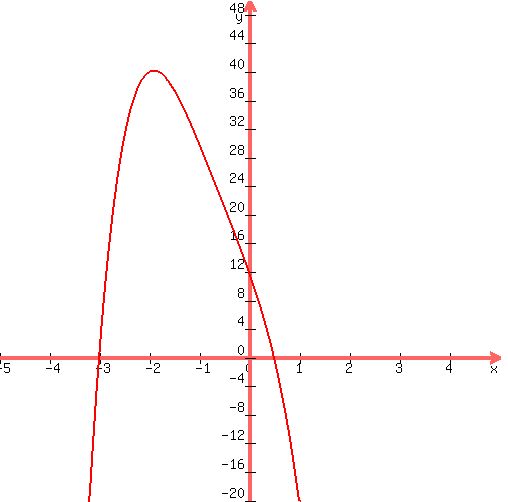|
Question 1144125: Can someone help me with this? Thank you.
I need to find all the zeros of the function f(x)=-2x^4-5x^3-5x^2-20x+12, given -3 is a zero.
Answer by ikleyn(52771)   (Show Source): (Show Source):
You can put this solution on YOUR website! .
You can apply the "Rational roots theorem" first.
The theorem will tell you that possible rational roots are among some finite set of rational and integer numbers.
It is good, but does not help too much.
Therefore, in such cases I simply make a plot of the polynomial, and the plot (see the Figure below) points you
all possible real / rational / integer roots.
 Plot y =
Plot y =  In this case the roots -3 and
In this case the roots -3 and  are pointed.
Surely, having this tip, you should check directly that these numbers really are the roots.
But if it is so, then the polynomial is divisible by the binomials (x-(-3)) = (x+3) and (2x-1).
Thus the polynomial should be divisible by the product (x+3)*(2x-1) = 2x^2 + 5x - 6 without a remainder.
So, make this long division and find the quotient. The quotient will be the polynomial of the degree 2 (quadratic).
Finding the roots of this quadratic is elementary job. (The rest of the roots could be complex numbers, though).
In this way, you will get the answer. are pointed.
Surely, having this tip, you should check directly that these numbers really are the roots.
But if it is so, then the polynomial is divisible by the binomials (x-(-3)) = (x+3) and (2x-1).
Thus the polynomial should be divisible by the product (x+3)*(2x-1) = 2x^2 + 5x - 6 without a remainder.
So, make this long division and find the quotient. The quotient will be the polynomial of the degree 2 (quadratic).
Finding the roots of this quadratic is elementary job. (The rest of the roots could be complex numbers, though).
In this way, you will get the answer.
Happy calculations (!)
---------------
Notice that I communicate with you, assuming that you are a real student, who knows some basics (adequate to the problem)
and is able to do the job and to complete it on his (or her) own, having clear instructions.
|
|
|
| |